新七下unit11知识点
人教版(新目标)初中英语七年级下册Unit11预习自学
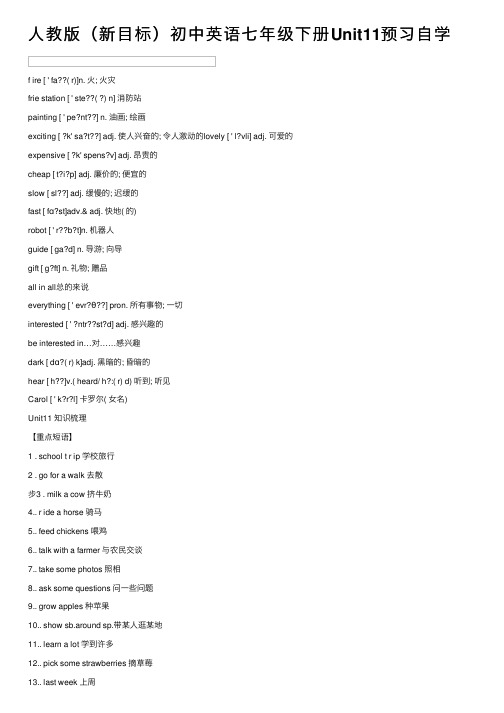
⼈教版(新⽬标)初中英语七年级下册Unit11预习⾃学f ire [ ' fa??( r)]n. ⽕; ⽕灾frie station [ ' ste??( ?) n] 消防站painting [ ' pe?nt??] n. 油画; 绘画exciting [ ?k' sa?t??] adj. 使⼈兴奋的; 令⼈激动的lovely [ ' l?vli] adj. 可爱的expensive [ ?k' spens?v] adj. 昂贵的cheap [ t?i?p] adj. 廉价的; 便宜的slow [ sl??] adj. 缓慢的; 迟缓的fast [ fɑ?st]adv.& adj. 快地( 的)robot [ ' r??b?t]n. 机器⼈guide [ ga?d] n. 导游; 向导gift [ g?ft] n. 礼物; 赠品all in all总的来说everything [ ' evr?θ??] pron. 所有事物; ⼀切interested [ ' ?ntr??st?d] adj. 感兴趣的be interested in…对……感兴趣dark [ dɑ?( r) k]adj. ⿊暗的; 昏暗的hear [ h??]v.( heard/ h?:( r) d) 听到; 听见Carol [ ' k?r?l] 卡罗尔( ⼥名)Unit11 知识梳理【重点短语】1 . school t r ip 学校旅⾏2 . go for a walk 去散步3 . milk a cow 挤⽜奶4.. r ide a horse 骑马5.. feed chickens 喂鸡6.. talk with a farmer 与农民交谈7.. take some photos 照相8.. ask some questions 问⼀些问题9.. grow apples 种苹果10.. show sb.around sp.带某⼈逛某地11.. learn a lot 学到许多12.. pick some strawberries 摘草莓13.. last week 上周14..In the countryside 在乡村15.. visit my grandparents 拜访我的祖⽗母16.. go f ishing 去钓鱼17.. sound good 听起来很好18.. climb the mountains 去爬⼭19 . play some games 玩⼀些游戏20 . visit a museum 参观博物馆21 .visit a f i re station 参观消防站22 . draw pictures 画画23 . go on a school t r ip 去旅⾏24 visit the science museum 参观科技博物馆25.. how to make a model robot 如何制作机器⼈模型26.. gift shop 礼品店27.. buy sth.for sb. = buy sb.sth. 为某⼈买某物28 .all in all 总得来说29 .be interested in...对… 感兴趣30 .be expensive 昂贵的31 .not. . . at all ⼀点⼉也不【重点句型】1 . --- Did you see any cows? 你见到奶⽜了吗--- Yes,I did.I saw quite a lot.我见到了⽽且见到了很多很多2.. --- Did Carol take any photos?罗尔拍照⽚了吗?--- Yes, she did. 是的,她拍了。
新目标英语七年级(下)Unit_11知识要点归纳
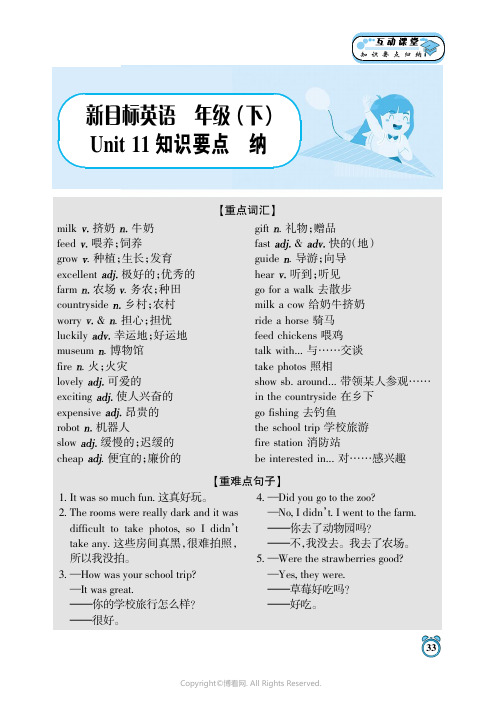
栏纳milk 挤奶牛奶feed 喂养;饲养grow .种植;生长;发育excellent 极好的;优秀的farm 农场.务农;种田countryside 乡村;农村worry &.担心;担忧luckily 幸运地;好运地museum .博物馆fire .火;火灾lovely 可爱的exciting 使人兴奋的expensive 昂贵的robot 机器人slow 缓慢的;迟缓的cheap .便宜的;廉价的gift .礼物;赠品fast &快的(地)guide .导游;向导hear 听到;听见go for a walk 去散步milk a cow 给奶牛挤奶ride a horse 骑马feed chickens 喂鸡talk with...与……交谈take photos 照相show sb.around...带领某人参观……in the countryside 在乡下go fishing 去钓鱼the school trip 学校旅游fire station 消防站be interested in...对……感兴趣1.It was so much fun.这真好玩。
2.The rooms were really dark and it was difficult to take photos,so I didn ’t take any.这些房间真黑,很难拍照,所以我没拍。
3.—How was your school trip?—It was great.———你的学校旅行怎么样?———很好。
4.—Did you go to the zoo?—No,I didn ’t.I went to the farm.———你去了动物园吗?———不,我没去。
我去了农场。
5.—Were the strawberries good?—Yes,they were.———草莓好吃吗?———好吃。
【重点词汇】【重难点句子】33Copyright ©博看网. All Rights Reserved.。
新目标英语七年级下Unit 11知识要点归纳

四川省资中县第二中学张家友Unit11知识要点归纳【重点单词点将台】1.mind v.介意mind常用于疑问句或否定句中,mind 后也可接动名词短语作宾语,但不能接动词不定式作宾语,也不能接双宾语。
例如:I don’t mind it.我不介意。
Would y ou mind my smoking here?你介意我在此抽烟吗?2.king n.君主;国王king常译为“君主;国王”,但是当king 大写首字母时就成了姓King(金)。
例如:—M r King,do yo u know w ho is the last king o f Qing Dynasty?金先生,你知道谁是清朝最后一个皇帝吗?—So rry,I don’t know.抱歉,我不知道。
3.fact n.事实;实际情况fact常与in连用构成介词短语in fact,意为“事实上,实际上”,一般用于句首。
例如:In fact,it’s easy to learn Eng lish well if yo u wo rk hard.实际上,如果你努力的话学好英语是很容易的。
4.agree v.同意;赞成agree常用来肯定别人的观点、建议等。
例如:—Chocolate is g ood fo r y our health.Do y ou ag ree?巧克力对你的身体有好处,你同意吗?—Yes,I do.是的,我同意。
5.put v.放;摆;装put常用的句型结构有:put+名词/代词+介词短语;put+名词/代词+副词(短语)。
例如:Can I put my boo ks here?我可以把书放在这儿吗?Put your shoes out o f thedoo r.把你的鞋放在门外。
6.idea n.主意;想法be full o f ideas意为“足智多谋”,而big /great idea意为“高见,好主意”;have no idea o f...意为“对……一点也不知道,完全不知道”。
新目标七下英语Unit11知识点梳理+课文和单词
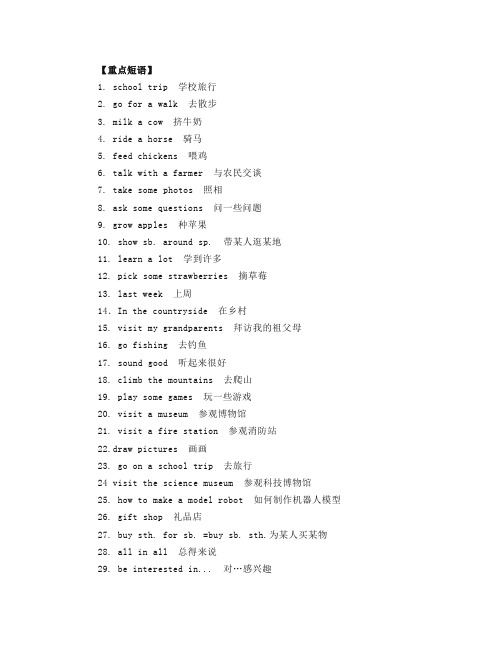
【重点短语】1. school trip 学校旅行2. go for a walk 去散步3. milk a cow 挤牛奶4. ride a horse 骑马5. feed chickens 喂鸡6. talk with a farmer 与农民交谈7. take some photos 照相8. ask some questions 问一些问题9. grow apples 种苹果10. show sb. around sp. 带某人逛某地11. learn a lot 学到许多12. pick some strawberries 摘草莓13. last week 上周14.In the countryside 在乡村15. visit my grandparents 拜访我的祖父母16. go fishing 去钓鱼17. sound good 听起来很好18. climb the mountains 去爬山19. play some games 玩一些游戏20. visit a museum 参观博物馆21. visit a fire station 参观消防站22.draw pictures 画画23. go on a school trip 去旅行24 visit the science museum 参观科技博物馆25. how to make a model robot 如何制作机器人模型26. gift shop 礼品店27. buy sth. for sb. =buy sb. sth.为某人买某物28. all in all 总得来说29. be interested in... 对…感兴趣30. be expensive 昂贵的31. not...at all 一点儿也不【重点句型】1.---Did you see any cows? 你见到奶牛了吗---Yes, I did. I saw quite a lot. 我见到了而且见到了很多很多2. ---Did Carol take any photos? 罗尔拍照片了吗?---Yes, she did.是的,她拍了。
七年级下册英语11单元笔记
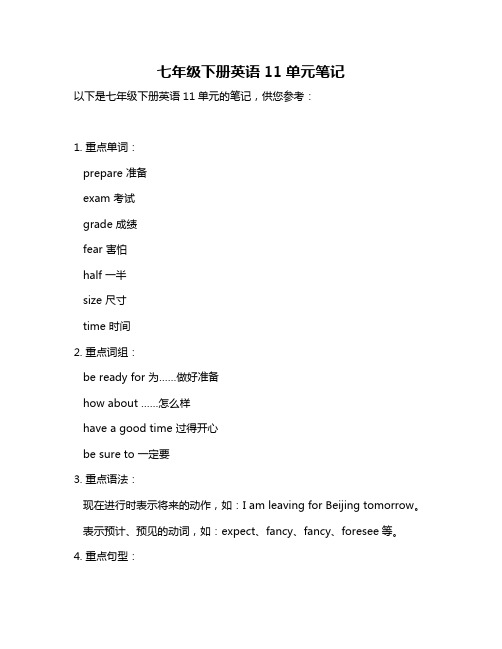
七年级下册英语11单元笔记
以下是七年级下册英语11单元的笔记,供您参考:
1. 重点单词:
prepare 准备
exam 考试
grade 成绩
fear 害怕
half 一半
size 尺寸
time 时间
2. 重点词组:
be ready for 为……做好准备
how about ……怎么样
have a good time 过得开心
be sure to 一定要
3. 重点语法:
现在进行时表示将来的动作,如:I am leaving for Beijing tomorrow。
表示预计、预见的动词,如:expect、fancy、fancy、foresee等。
4. 重点句型:
I am leaving for Beijing tomorrow。
我明天要去北京。
How about going to the park?去公园怎么样?
5. 重点话题:
谈论未来计划和安排,如旅游计划、考试准备等。
6. 重点写作:
用现在进行时写一封信,告诉朋友你即将去旅行或参加某个活动,并询问对方的计划和安排。
7. 重点阅读:
阅读一篇关于旅行的文章,了解旅行前的准备和注意事项。
英语:Unit11_what_do_you_think_of_game_shows复习课件(人教新目标七年级下)

2. 谈话节目 运动节目 游戏节目 肥皂剧 情景喜剧 3. 不能忍受 不介意
talk show sports show game show soap opera sitcom Can’t stand Don’t mind
Would you mind ______ opening (open ) the door? 4. …怎么样? How about …?
13.一副太阳镜 两副太阳镜
14. 钥匙链
A pair of sunglasses Two pairs of sunglasses Key ring
Ask sb about sth
15. 询问某人关于某事
This weekend I asked students subjects. A. for B. at C. about D. with Show sb. sth. 16.给某人看某物 Show sth. to sb. 她昨天给我看了她的照片。 She showed me her photo yesterday. She showed her photo to me yesterday.
6. 谢谢加入我们中。 Thanks for joining us. 7. 我给每个同学展示了六件物品。 I showed each student six things. 8. 一些他们的答案是有趣。 Some of their answers were interesting. 9. 请你把我的信放在下月的杂志上好吗。 Can you please put my letter in next month’s magazine? 10.我不能忍受老年人不能美丽的主意。 I can’t stand the idea that old people can’t be beautiful. 11. 我不介意年轻人怎么看我。 I don’t mind what young people think of me .
2020年人教版七年级英语下册Unit11 How was your school trip 要点详解
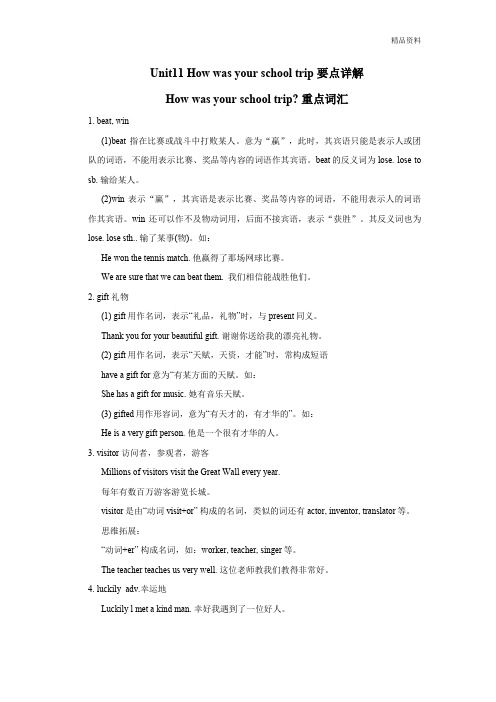
Unit11 How was your school trip 要点详解How was your school trip? 重点词汇1. beat, win(1)beat指在比赛或战斗中打败某人。
意为“蠃”,此时,其宾语只能是表示人或团队的词语,不能用表示比赛、奖品等内容的词语作其宾语。
beat的反义词为lose. lose to sb. 输给某人。
(2)win表示“赢”,其宾语是表示比赛、奖品等内容的词语,不能用表示人的词语作其宾语。
win还可以作不及物动词用,后面不接宾语,表示“获胜”。
其反义词也为lose. lose sth.. 输了某事(物)。
如:He won the tennis match. 他赢得了那场网球比赛。
We are sure that we can beat them. 我们相信能战胜他们。
2. gift 礼物(1) gift用作名词,表示“礼品,礼物”时,与present同义。
Thank you for your beautiful gift. 谢谢你送给我的漂亮礼物。
(2) gift用作名词,表示“天赋,天资,才能”时,常构成短语have a gift for意为“有某方面的天赋。
如:She has a gift for music. 她有音乐天赋。
(3) gifted用作形容词,意为“有天才的,有才华的”。
如:He is a very gift person. 他是一个很有才华的人。
3. visitor 访问者,参观者,游客Millions of visitors visit the Great Wall every year.每年有数百万游客游览长城。
visitor是由“动词visit+or”构成的名词,类似的词还有actor, inventor, translator等。
思维拓展:“动词+er”构成名词,如:worker, teacher, singer等。
The teacher teaches us very well. 这位老师教我们教得非常好。
新目标英语七年级(下)Unit11重难点精讲精练
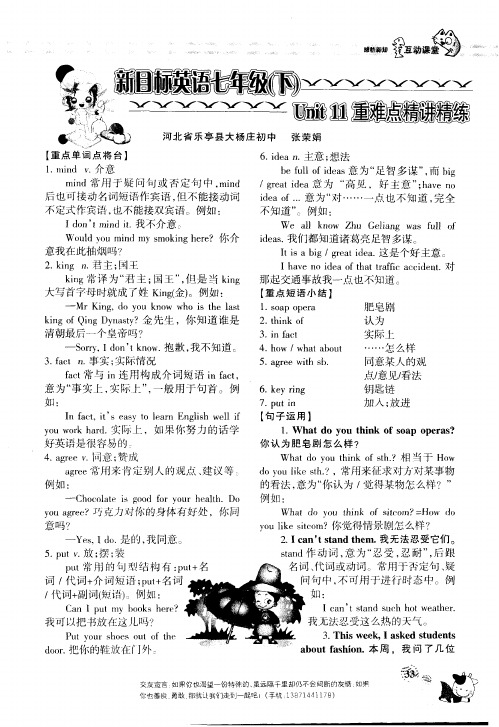
mn id常 用 于 疑 问句 或 否 定 句 中 , id mn 后 也 呵接动 名 同短语 作宾 语 , 但不 能 接 动词 不 定式作 宾语 , 也不 能接双宾 语 。例如 : I o ’ midi 我不介 意 。 n t n . d t Wol yumidmys oighr?你 介 ud o n m kn ee 意我 在此抽 烟 吗?
2 kn n 君 主 ; . ig . 罔王
ies 我们都 知道 诸葛亮 足智 多谋 。 da. I i abg/ ra ie. 是个好 主意 。 t s i get da 这
I aen e f ht rfcacd n. v oi ao ta t f cie t对 h d ai
卿
秣
筠
【 重点 单词 点将 台】
1 n n v 介意 .f d . i
6 ie j主意 ; .dar . 想法
b lo i a 意为“ ef l fd s u e 足智多谋” 而 h , i g
/ ra ie 为 “ 见 ,好 主 意 ” hy 0 get d a意 高 ;aen ie f 意 为 “ … …一 点 也不 知 道 , d ao … 对 完全 不知 道 ” 例如 : 。
-
1 .W ha ou t nk o o p o r s tdo y hi f s a pe a ?
你 认 为肥皂剧 怎么样?
Wh t oyu tiko t. 目 a d o n f h?丰 当 : o h s Hw
Ch c l t s o d o o r he lh o oa e i g o fr y u a t .Do
2020年人教版新目标七下Unit 11 How was your school trip 单词和课
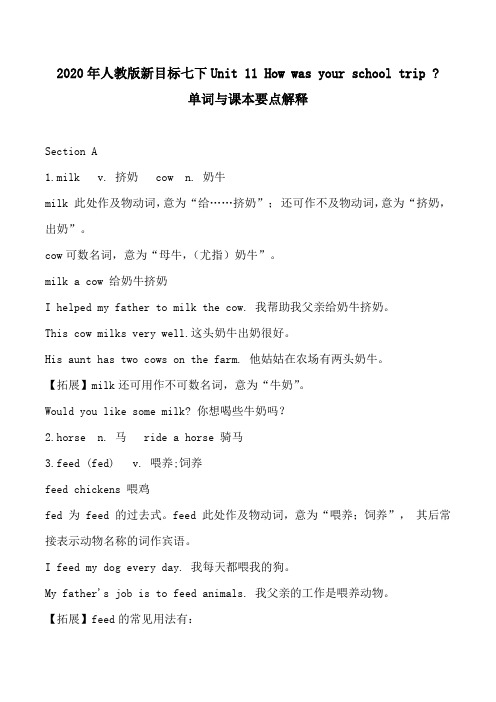
2020年人教版新目标七下Unit 11 How was your school trip ?单词与课本要点解释Section Ak v. 挤奶 cow n. 奶牛milk 此处作及物动词,意为“给……挤奶”;还可作不及物动词,意为“挤奶,出奶”。
cow可数名词,意为“母牛,(尤指)奶牛”。
milk a cow 给奶牛挤奶I helped my father to milk the cow. 我帮助我父亲给奶牛挤奶。
This cow milks very well.这头奶牛出奶很好。
His aunt has two cows on the farm. 他姑姑在农场有两头奶牛。
【拓展】milk还可用作不可数名词,意为“牛奶”。
Would you like some milk? 你想喝些牛奶吗?2.horse n. 马 ride a horse 骑马3.feed (fed) v. 喂养;饲养feed chickens 喂鸡fed 为 feed 的过去式。
feed 此处作及物动词,意为“喂养;饲养”,其后常接表示动物名称的词作宾语。
I feed my dog every day. 我每天都喂我的狗。
My father's job is to feed animals. 我父亲的工作是喂养动物。
【拓展】feed的常见用法有:①feed sth.to sb. /sth. 把某物喂给某人/某物Please feed some grass to the cow. 请给这头奶牛喂些草。
She fed milk to the baby. 她给婴儿喂了牛奶。
②feed on 以……为生,以……为食Sheep feed on grass. 绵羊以草为食。
③feed…on/with…用……喂……He feeds the dog on meat. 他用肉喂狗。
4.farmer n. 农民;农场主farm名词,意为“农场”;动词意为“耕种;干农活”。
人教版七年级下册英语Unit 11 知识点语法归纳总结

Unit 11 How was your school trip?1.短语归纳2.典句必背3.用法集萃(1)I saw quite a lot. 我看到了很多。
❖quite a lot表示“许多”,若表示“许多....(人或物)”要用quite a lot of... 的搭配。
例:I ate quite a lot last night. And I didn't feel well. 昨天晚上我吃了许多。
我觉得不舒服。
We saw quite a lot of sheep in the village. 我们在那个村庄里看到了许多绵羊。
(2)But I milked a cow. 但是我给一头奶牛挤奶。
❖milk 作名词,意为“牛奶”,是不可数名词。
例:I’d like a cup of milk. 我想要杯牛奶。
❖milk 作动词,意为“挤奶”。
例:I helped the farmer (to) milk the cow. 我帮助农民挤奶。
(3)Carol picked some strawberries and took them home.卡萝尔摘了一些草莓并且把它们带回了家。
❖pick用作动词,有“采;摘”之意。
此时是及物动词,宾语通常是花或果实等。
例:She went to the garden and picked some strawberries. 她去花园摘了一-些草莓。
❖拓展pick up是固定搭配,意为“捡起;拾起”,它的宾语有两种形式:(4)And I fed the chickens with my grandpa. 我还和我爷爷起喂鸡了。
❖feed作动词,意为“喂养;饲养”,它的过去式是fed。
例:Yesterday I went to the farm and fed chickens there. 昨天我去了农场并且在那里喂鸡了。
(5)But at about two o’clock, it got very cloudy and we worried it would rain.但是在大约两点时,天气变得多云了,我们担心会下雨。
七年级英语下册unit11howwasyourschooltrip重点单词及句型背诵默写人教新目标版93

Unit 11 重点短语及句型背诵(留存备用考前复习)Key Phrases重点短语1.go for a walk去散步k a cow给奶牛挤奶3.ride a horse 骑马4.feed chickens喂鸡5.talk with a farmer和一个农民交谈6.take some photos拍照7.show sb. around sp.带领某人参观某地 8.too many people太多人9.pick/grow strawberries摘/种草莓 st week.上周11.in the countryside在农村;在乡下 12.go fishing去钓鱼13. go on a school trip参加学校旅行 14.quite a lot(of...)许多15.climb the mountains爬山 e out出来,出现17.be interested in... 对......感兴趣 18.climb a mountain去爬山19.visit a fire station参观消防站 20. so much fun很有意思21.visit the science museum参观科学博物馆 22. after that从那以后23.teach sb.how to do sth.教某人怎样做某事 24.gift shop礼品店25. an exciting day一个令人兴奋的一天 26.go to the zoo去动物园27.no...at all一点也不,根本不 28.all in all总的来说29. learn a lot about ... 学了很多关....的知识Key Sentences 重点句型1.The farmer showed Carol around the farm. 这位农场主带领卡罗尔参观了农场。
2.Carol learned a lot about farming. 卡罗尔学了许多农事。
人教新目标版七年级英语下册中考考纲词汇详解: Unit 11 How was your school trip
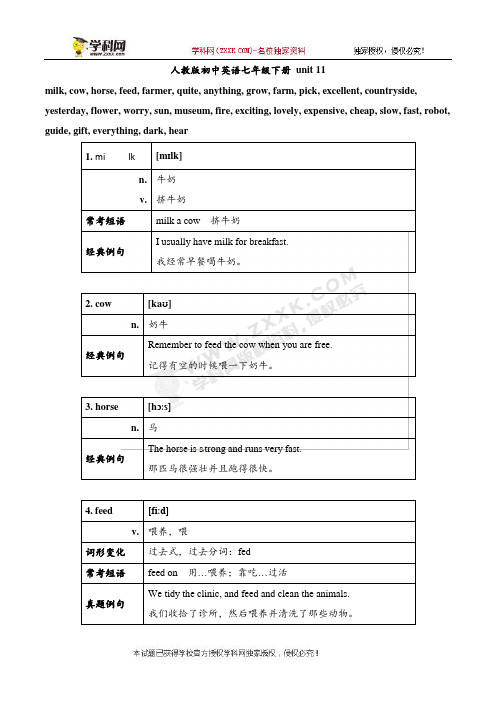
人教版初中英语七年级下册unit 11milk, cow, horse, feed, farmer, quite, anything, grow, farm, pick, excellent, countryside, yesterday, flower, worry, sun, museum, fire, exciting, lovely, expensive, cheap, slow, fast, robot, guide, gift, everything, dark, hear1. mi lk[mɪlk]n. v. 牛奶挤牛奶常考短语milk a cow 挤牛奶经典例句I usually have milk for breakfast.我经常早餐喝牛奶。
2. cow [kaʊ]n. 奶牛经典例句Remember to feed the cow when you are free.记得有空的时候喂一下奶牛。
3. horse [hɔːs]n. 马经典例句The horse is s trong and runs very fast.那匹马很强壮并且跑得很快。
4.feed [fiːd]v. 喂养,喂词形变化过去式,过去分词:fed常考短语feed on 用…喂养;靠吃…过活真题例句We tidy the clinic, and feed and clean the animals.我们收拾了诊所,然后喂养并清洗了那些动物。
5.farmer ['fɑːmə(r)]n. 农夫;农场主词形变化farm n.农场真题例句People should be grateful to a kindhearted farmer named Dan West.人们应该要对一个叫做丹﹒威斯特的好心农民心存感激。
6. quite [kwaɪt]adv. 相当,很常考短语quite a few 相当多真题例句Tom, a twelve – year – old boy, can speak English quite well.汤姆,一个12岁的男孩,能说英语说得很好。
人教版初中英语7年级下册unit11知识清单+习题 (附解答)

七下Unit 11 How was your school trip?一、必会单词:milk v挤奶cow n 奶牛feed v喂养;饲养farmer n.农民;农场主quite adv相当;完全anything pron任何东西;任何事物grow v种植;生长;发育excellent adj极好的;优秀的pick v采;摘countryside n乡村;农村worry v &n担心;担忧luckily adv幸运地;好运地museum n博物馆painting n 油画,绘画exciting adj.使人兴奋的;令人激动的lovely adj可爱的cheap adj.廉价的;便宜的expensive adj.昂贵的slow adj缓慢的;迟缓的fast adv&adj.快地(的)robot n 机器人guide n 导游,向导gift n 礼物,赠品everything pron.所有事物;一切interested adj.感兴趣的dark adj.黑暗的;昏暗的hear v听到;听见二、常考短语:go for a walk去散步milk a cow给奶牛挤奶ride a horse骑马feed chickens 喂鸡talk with与…谈话take photos拍照quite a lot(of)许多show. ..around 带领…参观learn about了解from...to…从…到…grow strawberries种植草莓pick strawberries摘草莓in the countryside在乡下;在农村go fishing去钓鱼at night在夜晚come out出来fire station 消防站go on a school trip参加学校郊游along the way沿途after that之后all in all总的说来take a/ the train乘火车be interested in对……感兴趣not…at all根本不……How be..?…怎么样?How do/does+主语+ feel about….? …对…感觉如何?too many+可数名词复数太多….teach sb. how to do sth.教某人怎样做某事quite a/an+形容词+可数名词单数=a very+形容词+可数名词单数相当/非常…buy sth. for sb.=buy sb.sth.为某人买某物It’s+形容词+ to do sth.做某事是……的。
2020年春人教新目标英语七年级下册期末知识点总结—Unit-11
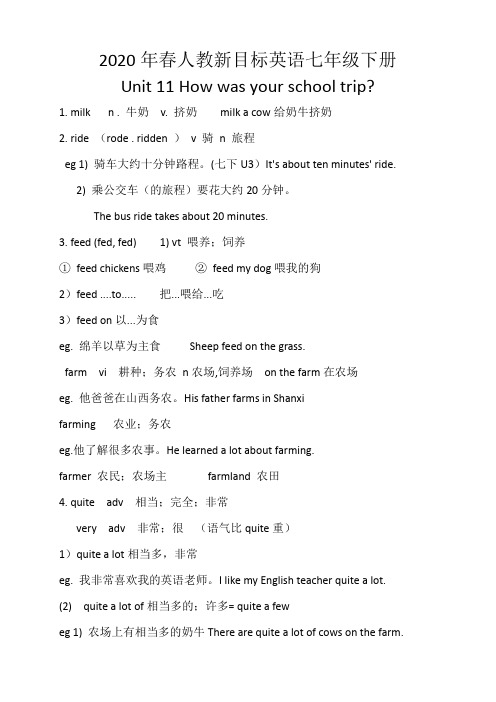
2020年春人教新目标英语七年级下册Unit 11 How was your school trip?1. milk n . 牛奶v. 挤奶milk a cow给奶牛挤奶2. ride (rode . ridden )v 骑n 旅程eg 1) 骑车大约十分钟路程。
(七下U3)It's about ten minutes' ride.2) 乘公交车(的旅程)要花大约20分钟。
The bus ride takes about 20 minutes.3. feed (fed, fed) 1) vt 喂养;饲养①feed chickens喂鸡②feed my dog喂我的狗2)feed ....to..... 把...喂给...吃3)feed on以...为食eg. 绵羊以草为主食Sheep feed on the grass.farm vi 耕种;务农n农场,饲养场on the farm在农场eg. 他爸爸在山西务农。
His father farms in Shanxifarming 农业;务农eg.他了解很多农事。
He learned a lot about farming.farmer 农民;农场主farmland 农田4. quite adv 相当;完全;非常very adv 非常;很(语气比quite重)1)quite a lot相当多,非常eg. 我非常喜欢我的英语老师。
I like my English teacher quite a lot. (2) quite a lot of相当多的;许多= quite a feweg 1) 农场上有相当多的奶牛There are quite a lot of cows on the farm.2)----你看到奶牛了吗?----是的,看到了。
我看到了相当多。
---Did you see any cows?---Yes, I did. I saw quite a lot.5. anything任何事物;某物everything所有事物;一切something某物nothing 什么都没有复合不定代词1)作主语时,视为单三。
七下英语书第11单元笔记

七下英语书第11单元笔记以下是七下英语书第11单元的笔记:
1. 重点单词:
be able to 能够
write down 写下
a little 稍微,有点儿,有几分
noisy 吵闹的
practice 练习
have to 不得不,必须
for sure 肯定地,有把握地
different 不同的
unless 除非
heavy 重的
enough 足够地,充分地
except 除了
2. 重点词组:
be able to do sth 能够做某事
write down sth 写下某事
be strict with sb 对某人要求严格
practice the guitar 练习吉他
3. 重点语法:情态动词“can”和“have to”的用法。
4. 重点句型:
I’m not sure. 我不太确定。
She is really noisy,but she can be very quiet,too. 她真的很吵闹,但有时也非常安静。
5. 学习建议:通过多种方式练习听说读写技能,例如听英语歌曲、看英语电影、阅读英文书籍等。
同时,多加练习语法和句型,提高自己的语言表达能力。
在学习过程中,要善于总结归纳,不断巩固所学知识。
新目标七年级下册英语unit11 what do you think of soap operas短语句子默写

Unit11What do you think of game shows? Ⅰ、Useful expressions:1.思考,认为________________2.游戏节目______________3.肥皂剧________________4.情景剧__________________5.电视节目________________6.不介意________________7.无法忍受_________8.体育节目_________9.事实上________________10.比介意它________________11.今日英语________________12.体育新闻________________13.健康生活________________14.中国文化________________15.中国美食________________16.动物世界_______________17.欢迎到某地_________18.…怎么样________________19.因做…而感谢________________20.和…交谈________________21.一副太阳镜________________22.三副太阳镜________________23.ask的用法_____________________________________________________________________ 24.玛丽的文章_________25.介意做某事_________26.enjoy_________27.show的用法__________________________28.show给每个学生看六件东西________________________________________29.他们答案中的一些_________30.他们的喜欢的和不喜欢的_________31.你的“什么是酷”的文章_________32.在学校杂志上_________________33.最醋的东西__________34.想做某事would____________35.tell的用法________________________________________________________________________________________________36.告诉你我想的________________37.你能做…吗________________否定____________________38.在下个月的杂志上________________39.无法忍受这个观点________________40.穿亮丽的衣服________________41.想年轻美丽________________42.喜欢好听的话________________43.关于我的外貌________________44.无法美丽Ⅱ、Sentences:1.你认为肥皂剧怎么样?2种________________________2.Shirley认为体育节目怎么样?________________________3.我无法忍受他们。
+Unit11讲义 人教版英语七年级下册
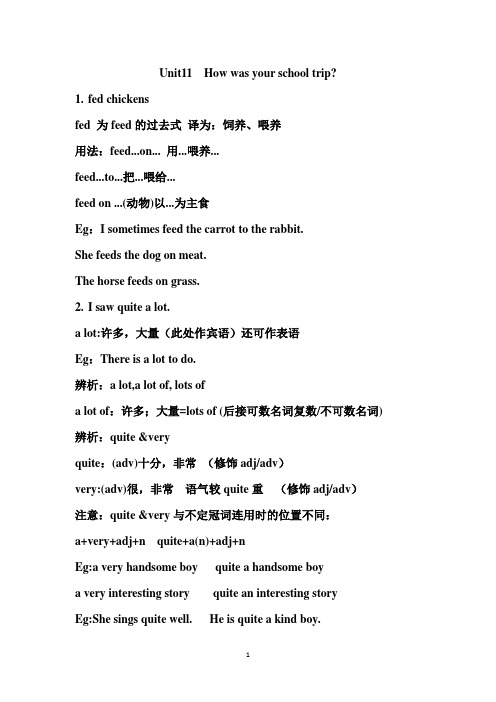
Unit11 How was your school trip?1.fed chickensfed 为feed的过去式译为:饲养、喂养用法:feed...on... 用...喂养...feed...to...把...喂给...feed on ...(动物)以...为主食Eg:I sometimes feed the carrot to the rabbit.She feeds the dog on meat.The horse feeds on grass.2.I saw quite a lot.a lot:许多,大量(此处作宾语)还可作表语Eg:There is a lot to do.辨析:a lot,a lot of, lots ofa lot of:许多;大量=lots of (后接可数名词复数/不可数名词) 辨析:quite &veryquite:(adv)十分,非常(修饰adj/adv)very:(adv)很,非常语气较quite重(修饰adj/adv)注意:quite &very与不定冠词连用时的位置不同:a+very+adj+n quite+a(n)+adj+nEg:a very handsome boy quite a handsome boya very interesting story quite an interesting storyEg:She sings quite well. He is quite a kind boy.This kind of fruit is very healthy. Thank you very much.3.Did you learn anything?辨析:anything&somethinganything:(不定代词)任何事物;某事物(常用于否定句/疑问句中) something:(不定代词)某事(常用于肯定句中) 但是在表示请求、建议、或征求意见的疑问句中常用something注意:(1)adj修饰不定代词,要位于其后(2)不定代词作主语时,谓语动词用单数形式(3)补充其他不定代词some any no every/body thing oneEg:There isn’t anything wrong.There is something wrong with my computer.4.The farmer showed Carol around the farm.farmer:(n)农民farm:(n)农场;(v)干农活farming:(不可数n)农事Eg:The farmers are working on the farm,and there is too much farming.show sb.around...带某人到处参观...Eg:The guide shows us around the museum.与show相关的短语:show sb.sth=show sth.to sb.给...看展示on show 展览show off 炫耀show up出现5.The farmers don’t grow apples.grow:(vt)种植;栽培(vi)生长;发育Eg:Farmers in the south of China mainly grow rice.Everything begins to grow in spring.短语:grow up成长,长大grow into成长为;发展成(由一种情况变成另外一种情况)Eg:I want to be a guide when I grow up.She grows into a lovely girl.辨析:grow&plantgrow: 种植(强调过程/状态)plant:(v)种植(仅表示栽入土中,表示动作)(n)植物Eg:The farmers grow a lot of trees every year.The farmers plant lots of trees every year.There are many different plants in the garden.6....we worried it would rain.worry:(vt)担心;担忧后常接宾语从句Eg:His parents worry that their child will sick.(vt)使担心;使发愁(常接sb.作宾语)Eg:The naughty boy worries his parents.worry about sb./sth.=be worried about sb./sth. 担心某人/某事Eg:Don’t worry about me ./Don’t be worried about me.7.Luckily,it didn’t,and the sun came out again.(1)luckily(adv)幸运地常用于句首,用逗号隔开unluckily不幸地unfortunately fortunate(adj)幸运的fortunately(adv)幸运地以辅音字母+y结尾的形容词变成副词的方法:改y为i再加ly Eg:happy lucky busy angry easy(2)sun moon earth star 都是世界上独一无二的事物,前面必须加the(3)come out出来;发芽;开花;出版与come相关的短语:come from来自come on加油;快点come back 回来come down 下来come in 进来come up with 提出;想出;赶上come across遇到8.expensive/cheapexpensive/cheap只能形容事物的贵贱;当谈论价格(price)时,只能用high/lowEg:The pen is cheap.=The price of the pen is low.9.All in all,it was an exciting day.all in all:总的来说;总之in a word:简言之in short:总之Eg:All in all, it’s good for you to do more exercise.辨析:all in all, in all,at allall in all:总的来说(常用于句首)eg:All in all, we had a good time. in all:总共;合计(句首/句末)eg:There are fifty students in all.at all:根本常用于“not at all”根本不Eg:He doesn’t like apples at all.与all相关的短语:all the time 一直after all 毕竟10.I didn’t like the trip at all.Not at all 用于回答感谢/道歉Eg:---Thank you very much.---Not at all.其它的回答:It’s my pleasure. It’s a pleasure. No problem.You’re welcome. That’s all right. That’s OK.一般过去时态含义:表示过去某个时间发生的动作或存在的状态,也表示过去经常或反复发生的动作。
- 1、下载文档前请自行甄别文档内容的完整性,平台不提供额外的编辑、内容补充、找答案等附加服务。
- 2、"仅部分预览"的文档,不可在线预览部分如存在完整性等问题,可反馈申请退款(可完整预览的文档不适用该条件!)。
- 3、如文档侵犯您的权益,请联系客服反馈,我们会尽快为您处理(人工客服工作时间:9:00-18:30)。
春季学期七年级英语下册各单元知识点大归纳
Unit 11 How was your school trip?
◆短语归纳
1. go for a walk 去散步
2. milk a cow 挤牛奶
3. ride a horse 骑马
4. feed chickens 喂小鸡
5. talk with 与……谈话
6. take photos 拍照
7. quite a lot 相当多8. show… around 带领……参观9. learn about 了解10. from… to… 从……到……11. grow strawberries 种植草莓12. pick strawberries 采草莓13. in the countryside 在乡下14. go fishing 去钓鱼
15. at night 在夜晚16. a lot of 许多;大量
17. come out 出来18. go on a school trip 去学校郊游19. along the way 沿线20. after that 之后
21. buy sth. for sb. 为某人买某物22. all in all 总的来说
23. take a / the train 乘火车24. be interested in 对……感兴趣25. not… at all根本不……
【用法集萃】
2. too many + 可数名词复数太多的……
3. teach sb. how to do sth. 教某人怎样做某事
◆语法点拨
重点句子:
1.Did you see any cows?你看见奶牛了吗?
Yes,I did. I saw quite a lot.是的,我看见了许多。
quite + a / an + 形容词+可数名词单数
= a + very + 形容词+ 可数名词单数一个相当/ 很……
2. Did you ride a horse?你骑马了吗?
No, I didn’t. But I milked a cow.不,我没有,但我挤牛奶了。
did的各种句式:
⑴.肯定句:主语+动词过去式+
其他。
⑵否定句:主语+didn’t+动词原形+其他。
⑶一般疑问句:Did+主语+动词原形+其他?
肯定答语:Yes, 主语+did. 否定答语:No, 主语+didn’t.
如:
—Did you ride a horse?
—Yes, I did.
(肯定回答)
—No, I didn’t.
(否定回答)
⑷特殊疑问句:疑问词+did+主语+动词原形+
其他?3.How was your school trip?你的学校旅游怎么样?
How + be…? + like? ……怎么样?
4.What did Tina do? 蒂娜干什么了?
She picked some strawberries.她摘了一些草莓。
pick strawberries 采草莓
5.I visited my grandparents in the countryside.我看望了我在农村的祖父母。
in the countryside 在乡下
6.I went fishing every day.我每天钓鱼。
go fishing 去钓鱼
7.The farmer showed Tina around the farm.农场主带领特纳参观了农场。
8.It got very cloudy and we worried it would rain.天阴得很厉害,我们担心将要下雨。
9. Then the guide taught us how to make a model robot.
然后,导游叫我们怎样制作机器人模型。
10.All in all, it was an exciting day.总之,这是令人激动的一天。
all in all 总的来说
11.Everything was about robots and I’m not interested in that.
一切事情都是关于机器人的,我对那不感兴趣。
be interested in 对……感兴趣
12. The rooms were really dark and it was difficult to take photos.
房间真的很暗,拍照很困难。
